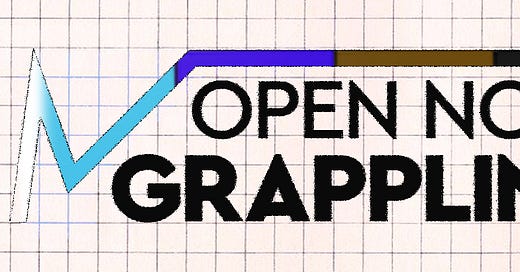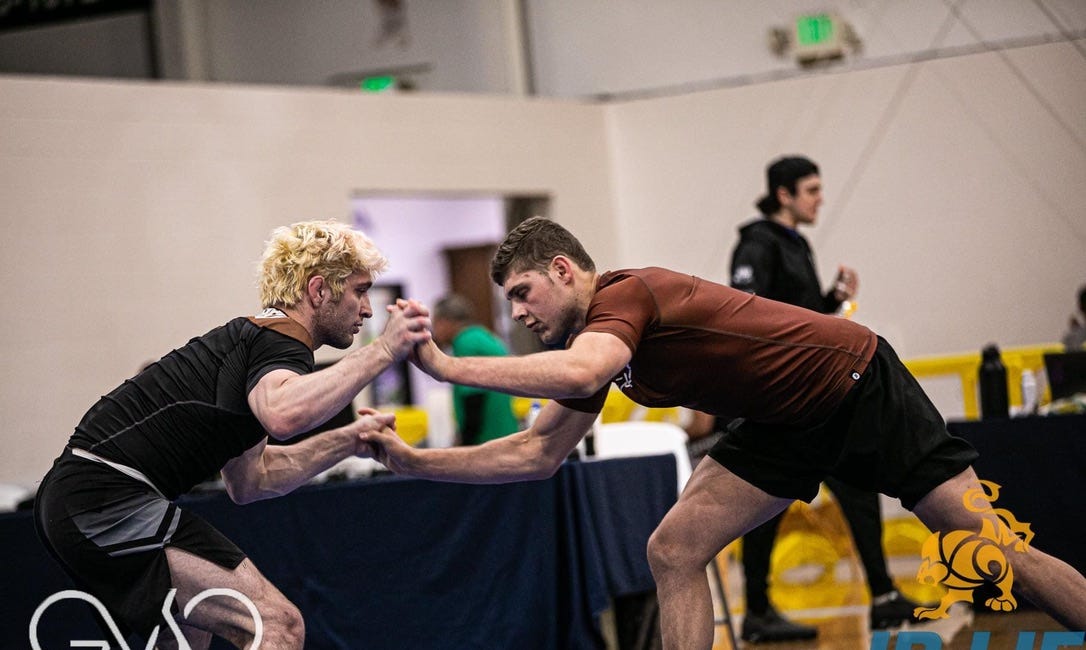This article that you’re about to read is one of my favorite grappling-related articles that I’ve read in a long time.
William Watts has contributed to The Grappler’s Diary before, and now he’s writing one of my favorite grappling newsletters out there today — Open Note Grappling.
Today I have an article for you that was shared directly in his newsletter about a week ago. I hope you enjoy it as much as I did, and make sure to subscribe to William’s newsletter so you can get more articles like this in your inbox every week.
First Things First
Today we’re talking about why quitting is more important than competing, why you don’t need “perfect” training, and what to do when you’re done. If you’re a competitor, or unsure if you should be, this post is for you.
Thanks for checking out Open Note Grappling! If this is your first time here, click here to check out the rest of my work.
How To Shrink Infinity: Why You Shouldn’t Compete
Polishing And Professionalizing Brazilian Jiu-jitsu
The judo practitioners of today do not make enough effort to achieve the goals of judo and have overemphasized becoming strong or winning in competition, which are merely means rather than ends.
Jigoro Kano, Mind Over Muscle
Every week I get asked about competing in Brazilian jiu-jitsu and MMA. Should I do it? Am I ready? How should I prepare for xyz?
I love teaching but I couldn’t care less if any of my students want to compete.
Don’t get me wrong, I love supporting competitors and helping people rise through the ranks. That’s what not keeps me teaching and it’s definitely not what keeps me training.
I understand why everyone flirts with the idea of competing. Competitors get the glory and glory feels good. They (allegedly) move the sport forward too.
I don’t necessarily agree that competitors are the only thing that moves sports forward, but I do recognize that competitors and competitions are motivational. I also understand that the technical innovations of our sport in particular are validated in competition. Still, in Brazilian jiu-jitsu’s quest to get ever larger, I’m wary of the sports’ rush to polish and perfect every aspect of grappling.
Recently I was having a conversation with one of my friends. Let’s call him Jack. Jack is a black belt that has been training upwards of 15 years across different states and countries. Jack knows what a good room is.
Jack trains at a different gym than I do and they are upset with the room. The rolls are hard and the instruction is great, but they are annoyed with some of their partners’ attitudes. Jack claims their partners refuse to roll with people that don’t move the “right” way.
On the surface, Jack’s partners’ attitudes are logical. You want someone to move like a high level competitor so you’re more prepared to deal with more proficient martial artists. This argument completely misses the forest for the trees.
Grappling is the sport of control. Your job is to control your opponent. Who cares what they do? If they make a mistake, exploit it. Submit them. You need to control your opponent regardless of if they are moving the “right” way or not. You can’t be fixated on the right deep finite path. You need to be able to control a broad, essentially infinite, set of actions and reactions.
Depth vs breadth. Both pursuits are inherently valuable, they get to the essence of why so many people love grappling sports, and why no one should feel forced to compete.
Playing For Infinity
The sports that come from jiujitsu are what’s known as finite games. The martial arts Brazilian jiu-jitsu and Judo are considered infinite games.
An infinite game is defined as one with no end. It’s done for the sake of doing. A finite game involves specific participants going down distinct paths to established ends. The man that first coined this terminology, James P. Carse, defines them and their differences as the following:
There are at least two kinds of games: finite and infinite. A finite game is played for the purpose of winning, an infinite game for the purpose of continuing the play. Finite games are those instrumental activities - from sports to politics to wars - in which the participants obey rules, recognize boundaries and announce winners and losers. The infinite game - there is only one - includes any authentic interaction, from touching to culture, that changes rules, plays with boundaries and exists solely for the purpose of continuing the game. A finite player seeks power; the infinite one displays self-sufficient strength.
Part of the reason why martial arts are inherently enjoyable is because they are infinite games. You show up, explore the technical and tactical elements of the art, and continue until you can’t. This day and the next, you do them for the sake of doing. Grappling sports’ rapid acceleration towards professionalization is limiting this infinite exploration. Strategies are becoming highly defined, rules are being gamed, and infinity is shrinking, fast. Art, martial or not, is not done a right or wrong way. You do it or you don’t.
I’m not one to tell a professional athlete how to do their job, especially if it costs them a win. But, as this trend plays out across grappling sports, I can’t help but think, “Doesn’t this kind of take the point out of it?”
Right now New Wave jiujitsu is probably the most successful team in submission grappling. Their team is made up of two of the most dominant athletes competing today, Nicholas Meregali and Gordon Ryan, submission grappler turned MMA contender Garry Tonon, and has several other rising stars in Giancarlo Bodoni, Helena Craver, Dan Manasoiu, and Luke Griffin.
We’ve already examined what made the team’s game excellent so we don’t need to discuss any techniques in detail here. What does need to be stated explicitly is how remarkably similar their games are.
Upper body wrestling and judo techniques start the match. If they can’t get a takedown they sit to use leg entanglements to submit, or off balance and sweep. When they get on top they pass in tight to advance towards the mount, and if at any point their opponent turns away they’re on their back looking for the rear naked choke.
Simple, brutally effective, and unquestionably successful. A razor sharp holistic system that presents deep knowledge of the positions they play and the sport at large.
You can make the argument that New Wave is effectively solving the sport of no gi submission grappling in real time. Because of their success, you see countless New Wave copycats, and I’m not here to say that learning from elite competitors is a bad thing, nor that their approach to the sport is insufficient. I’m certainly not going to claim that I haven’t benefitted as a student and spectator. I’m here to say the sport of submission grappling that they are competing in and refining is not the infinite game that so many people derive benefit from. Copying someone else’s finite gameplay isn’t going to give you the same benefits it gave them.
Infinite games are done for the sake of doing. Finite games are done for the sake of winning. Infinite games are inherently enjoyable, give purpose to your days, and never end. Eventually all finite games finish, and not every player is better for competing.
Successive Finite Games And Infinite Opportunities
Tony Ferguson recently lost a fight against UFC prospect Paddy Pimblett. Like many mixed martial arts fans, I’m a bit concerned about what that means.
Ferguson hasn’t won a fight in three and a half years. In those years he’s lost seven, with him getting stopped on four separate occasions. This stretch has been more than a dramatic turn.
During Ferguson’s first eight years in the UFC he won fifteen fights, only lost once by decision, and beat two previous UFC title holders. The man lived up to his boogeyman nickname and earned an interim title in the process.
Ferguson used his martial arts pursuit to put a roof over his family’s head, but that’s not what Ferguson is playing finite games for. Ferguson is fighting to be a champion, not interim, and that has yet to come. Ferguson has yet to win his finite game, he’s losing his ability to meaningfully compete in it, and he’s locked to the board.
Here is where the rubber meets the road. I think know some people should compete in martial arts. Some people need finite games to push themselves. They need an occasion to rise to and platforms to launch themselves from.
It seems obvious that Ferguson had no other option, no other finite games to play, but he has conflated his finite game with the infinite one. The longer he does, the less finite games he’ll be able to play down the road.
An interesting contrast to Tony Ferguson is MMA pioneer Genki Sudo.
18 years ago at just 28 years old, Sudo retired out of nowhere after a submission win in his prime. Sudo announced his retirement in the ring, said we’re all one, and walked away from mixed martial arts with a 16-4-1 record. He then went on to found techno dance group WORLD ORDER before getting elected to Japan’s House of Councillors, part of their national parliament, in 2019.
MMA fighter turned EDM star and political leader is as cool a bio as you’re ever going to read, but that’s not the point. It doesn’t even matter that Sudo left on a win or what he did after. The important thing is that Sudo advanced through his life intentionally. Sudo used successive finite games to advance through his own infinite game.
Sudo did not wait until he was pushed off of the board to fall on another. Sudo played the finite game of fighter until it was time to play the finite game of performing musician. After Sudo won enough prestige from both he started playing the political game he does today.
Eventually everyone’s finite game(s) will end and not everyone can exit theirs as gracefully as Sudo did. The only thing you can control is ensuring that you playing finite games leaves you with enough pieces to play out the rest of your own infinite game.
Sudo is an extreme example. Not everyone can be a professional athlete, EDM star, and politician before their fiftieth birthday. But thinking about Sudo and Ferguson’s lives makes me wonder, how can we find finite games to play? When do we know when to quit? Most importantly, how can we best design a unique infinite game?
More Problems Simplify Infinite Games
Anthony Bourdain’s death is the only celebrity death that left me beside myself. When he took his life it felt like I lost out on the chance to make what would be a lifelong friend. I don’t work in restaurants and I didn’t look up to him for his culinary background. I admired Bourdain because of the totality of his lived experiences, his writing abilities, and his dedication to Brazilian jiu-jitsu.
When Bourdain died, the artist Immortal Choke sold shirts to raise money for mental health research. The shirts were designed with his words about jiujitsu spread across the chest:
I do it because it’s hard. Because it’s the hardest thing I’ve ever done. And because it never ends. Every day presents me with a series of problems that I spend the rest of the day thinking about how I might solve — or at least chip away at. Next day same. And the day after that.
Anthony Bourdain
I’m not bringing Bourdain up as a stupid attempt at brushing against the whole “jiujitsu saved my life” narrative. That’s grossly overstated at best.
I bring Bourdain and his late life jiujitsu fascination up because “a series of problems that I spend the rest of the day thinking about how I might solve — or at least chip away at.” is the most direct and eloquent description of an infinite game composed of finite games that I could ever think of.
Finite games are the individual problems you solve and goals you achieve, but when they’re done you should be as well. You need to move on when either the problem is done or you are unfit to continue working on it. That’s how you approximate Genki Sudo’s fascinating and fulfilling life while avoiding the trap of competing past your expiration date.
So, how can we find successive finite games to build our own unique infinite game? Go after what strikes your curiosity. When you find questions and problems you can’t help thinking about, go towards them. And when you no longer obsess over the problem you’re trying to chip away at, go look for something else.
This might read like I tell all my students to give up before they really get pushed. I don’t and I’m not saying that here.
You need to give your finite games everything you have and recognize when you’ve hit an unsolvable limitation, whether that limitation is from competition, your personal traits, or time. If continuing to play finite games will leave you in a place where you can’t give what you earned from competition back to the world, then you should stop immediately.
Now back to the question at hand. Should you compete? Sure. If you want to. If it is a fascination you can’t escape, yes. If this competition is a piece of your infinite game then you need to compete. But don’t expect that competition to give you anything other than a win. In the words of former UFC light heavyweight champion Rashad Evans:
“When I beat Forrest Griffin for the title, I felt really, really happy, but at the same time I felt kind of empty too. I remember after I won the belt, I was in a state of like, 'Is that it? That's it I guess.' I just climbed to the top of the hill and it was just a hill.
Like infinite games, your life is not something that can be won. You’re probably not going to be simply happy or sad for large portions of your life. You can be challenged, disappointed, and deeply invested in what you do (and I hope you are!) but an endless pursuit of finite results and static feelings out of context for a greater uniting cause leaves everyone empty.
Some people compete in finite games for a paycheck. Some people use finite game success to advance to influential places in the world. Some choose to teach and give back to others that want to play their own finite games. Whatever you’re using finite games for, the thing that actually matters is not getting wrapped up in finite games.
We started this ramble out by borrowing some words from judo’s creator, Jigoro Kano. He explicitly said judo is a means and not an end. What is an appropriate end then? If competing in martial arts is only a finite game, what is the infinite game our hobbies can prepare us for?
Becoming strong, whether through judo or another form of exercise, has value only when one puts that strength to use for society.
Jigoro Kano, Mind Over Muscle
Citations & Further Viewing
Mind Over Muscle by Jigoro Kano
Finite and Infinite Games by James P. Carse
Share & Support Open Note Grappling
Open Note Grappling is a user-supported publication. If you enjoy reading my writing, consider upgrading to the Premium Notebook! A premium subscription gets you:
More content
Access to my full archive
Weekly flowcharts and lesson plans to improve your training
Long-form detailed studies of specific athletes and positions
You can upgrade and try the Premium Notebook for free here. What are you waiting for?
This article was written by my Twitter friend, William Watts. William is a BJJ black belt, writer, and co-founder of the brand-new, opening soon East Austin Jiu-Jitsu Parlor here in Austin, Texas.
If you enjoyed this post, be sure to check out some of William’s other articles in The Grappler’s Diary below and click on the ❤️ button at the bottom of this post so more people can discover it on Substack!
What They SAID About Bands
My Current Training State Six weeks ago I had a torn ACL repaired. The ligament was completely ruptured and looked like it was folded back up into itself. Before I got an MRI to confirm the injury, an orthopedic surgeon performed the Lachman Test on me. He sounded so matter of fact when he proclaimed, “Yeah, there’s nothing here.” Nothing in this room ot…
Why We Suck at Wrestling
Hey everyone, Today I have a guest post from William Watts. William is a black belt under Jose Portillo and trains out of Paragon BJJ in Austin, Texas. I recently connected with him on Twitter. On his blog, William writes in-depth technical articles on BJJ techniques and trends.








